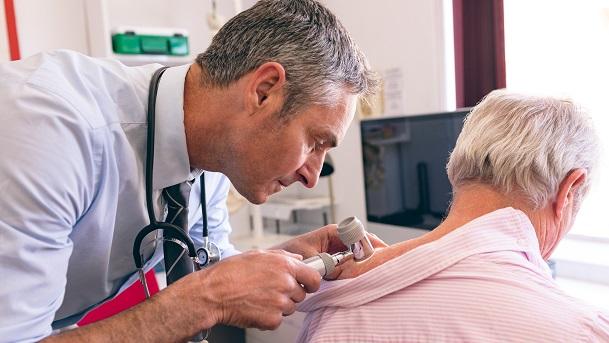Skin Cancer Risk With Common Diuretics Confirmed Anew
A Canadian study of patients over age 65 echoes earlier Danish research that led to drug warnings for hydrochlorothiazides.

New data add strength to prior observations that long-term exposure to thiazide diuretics is associated with a higher risk of developing some types of skin cancer.
Recently, Health Canada, the US Food and Drug Administration (FDA), and the European Medicines Agency issued warnings about the association based on the findings of two Danish studies that looked at hydrochlorothiazide. The FDA added labeling changes to address the increased risk in August 2020. The new data, this time from Canada, back up the Danish findings in a large cohort of older adults, noted Aaron M. Drucker, MD (Women’s College Hospital, Toronto, Canada).
In the paper, published April 12, 2021, in CMAJ, Drucker and colleagues say the lack of association between cancer occurrence and other anti-hypertensive drug classes suggests that hydrochlorothiazide’s phototoxicity—similar to that of tetracycline—may account for the increased risk.
They suggest that patients taking thiazide should consider using sun protection and monitoring for early detection of skin cancer. However, Drucker stressed that patients should not be overly alarmed by the findings or stop taking prescription hydrochlorothiazide out of fear of developing skin cancer.
“I think what's important for people to realize is that the risk that we found is probably more relevant to certain segments of the population that have a baseline risk consistent with people with fair skin, those who have had a skin cancer before, or people who have a lot of sun damage or who have used artificial tanning,” he added. “If you are someone with that [higher] risk, having a discussion with your doctor about whether you should still be on it, or what you might do to mitigate the risk of skin cancer if you are going to be on it long-term, is probably a good idea.”
Important Part of Global Replication
For the study, Drucker and colleagues compared data for 302,634 patients aged 66 years or older prescribed an antihypertensive medication in Ontario between 1998 and 2017 against those for 605,268 age- and sex-matched adult controls not prescribed a antihypertensive. The most commonly prescribed medication classes were ACE inhibitors (37%), followed by thiazide diuretics (29%), beta-blockers (23%), calcium-channel blockers (17%), and ARBs (9%). The number of physician visits and comorbidities other than hypertension at baseline were similar between groups.
At a median of 8.9 years, increasing exposure to a thiazide diuretic was associated with higher rates of keratinocyte carcinoma (adjusted HR 1.08; 95% CI 1.03-1.14) and melanoma (adjusted HR 1.34; 95% CI 1.01-1.78). Compared with the lowest exposure category, those in the highest exposure category had a 44% higher rate of keratinocyte carcinoma, a 52% higher rate of advanced keratinocyte carcinoma, and a 60% higher rate of melanoma.
In 2017 and 2018, two Danish studies were the first to report the dose-response relationship. In one, patients with the highest cumulative exposure to hydrochlorothiazide had an OR of 1.54 (95% CI 1.38-1.71) for basal-cell carcinoma and OR 7.38 (95% CI 6.32-8.60) for squamous-cell carcinoma compared with controls. In the other study, patients with the highest cumulative exposure had an OR of 7.7 (95% CI 5.7-10.5) for developing lip cancer compared with controls. Neither of those studies found any association between other diuretic or nondiuretic antihypertensives and skin cancer.
Drucker said his group’s findings add credibility to the observations to date and make it harder to attribute them to other things such as hypertensive patients having more contact with the healthcare system and therefore a greater likelihood of having a skin cancer detected.
The lead author of the Danish studies agreed, telling TCTMD that the new data represent an important part of a series of global replications, almost all of which have consistently shown the same thing.
“What if it was a genetic thing specific to Danes or caused by another factor we had overlooked? These studies all have different strengths, and in totality, provide strong evidence for hydrochlorothiazide causing the skin cancers,” Anton Pottegård, MScPharm, PhD, DMSc (University of Southern Denmark), said in an email.
Pottegård added that for patients at particularly high risk, it makes sense to consider switching to other antihypertensives. “Of note, even other thiazides might be relevant, as both our and other studies have shown this effect to be specific to hydrochlorothiazide, while such an effect is not observed for bendroflumethiazide,” he explained.
From a public health perspective, the issue of the increased risk appears to be settled, although Pottegård said some additional work could be helpful, including whether there is an association between hydrochlorothiazide and rare types of skin cancer such as Merkel cell carcinomas and various subtypes of melanoma.
L.A. McKeown is a Senior Medical Journalist for TCTMD, the Section Editor of CV Team Forum, and Senior Medical…
Read Full BioSources
Drucker AM, Hollestein L, Na Y, et al. Association between antihypertensive medications and risk of skin cancer in people older than 65 years: a population-based study. CMAJ 2021;Epub ahead of print.
Disclosures
- Drucker reports consulting fees from Sanofi, RTI Health Solutions, Eczema Society of Canada, and Canadian Agency for Drugs and Technology in Health; honoraria from CME Outfitters; and grants to his institutions from Sanofi and Regeneron.
- Pottegård reports no relevant conflicts of interest.





Comments